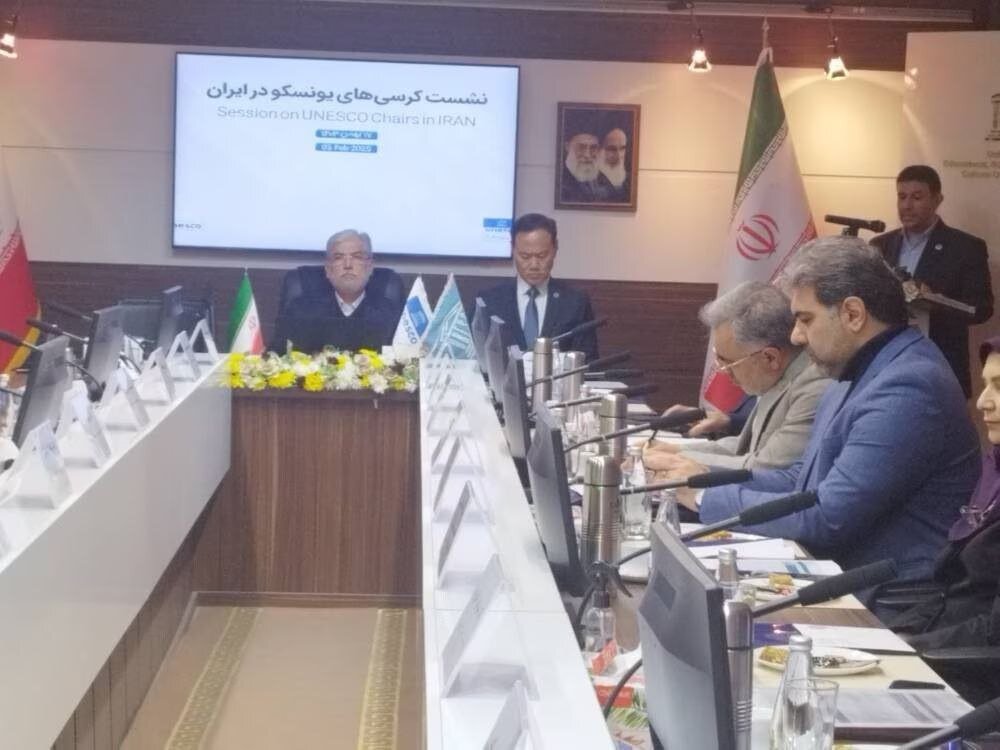Iran utilizes UNESCO Chairs to strengthen scientific diplomacy

TEHRAN –With 18 UNESCO Chairs in various fields, including education, natural sciences, social and human sciences, and communication and information, Iran is working to leverage the potential of these chairs to deepen scientific and research collaborations worldwide.
To highlight the importance of UNESCO Chairs in advancing scientific exchange, diplomacy, and sustainable development, the Iranian National Commission for UNESCO in collaboration with the UNESCO Tehran Office, organized the first meeting of UNESCO Chairs in Iran, the UNESCO website announced in a press release on February 23.
Addressing the opening ceremony, Hossein Simaei-Sarraf, Minister of Science, Research, and Technology, who also serves as the President of the National Commission for UNESCO in Iran, emphasized the critical role of UNESCO Chairs in promoting scientific research and the exchange of knowledge across borders.
He called for increased support for these chairs, particularly in the cultural sector, and advocated for their expansion beyond Tehran to universities and institutions across the country.
The official noted that despite challenges such as financial limitations and international sanctions, Iran continues to make remarkable progress in fields like nanotechnology, biotechnology, and artificial intelligence.
Iran’s Ambassador and Permanent Delegate to UNESCO, Ahmad Pakatchi, for his part, emphasized the pivotal role of science in building bridges between nations and fostering global cooperation.
Secretary-General of Iran’s National Commission for UNESCO, Hassan Fartousi, emphasized the importance of strengthening national and international collaboration; he also highlighted the role of these chairs in addressing global challenges such as climate change, bioethics, and artificial intelligence, underlining their capacity to foster peaceful dialogue through scientific engagement.
The Head of the UNESCO Tehran Office, Ieng Srong, also provided key insights into the role of UNESCO Chairs. He described them as more than just academic research centers, noting their significance in addressing emerging global challenges. He touched on the efforts being made to connect UNESCO Chairs with funding sources and global research networks to maximize their impact and sustainability.
For her turn, Ms. Prince, UNITWIN/UNESCO Chairs Programme Manager, highlighted the importance of global interaction and cooperation, particularly through South-South cooperation models. She also emphasized that the social impacts of UNESCO Chairs go beyond education and research, calling for more active participation of these chairs in global projects. She highlighted the critical role of host institutions and their commitments, urging university leaders to actively support UNESCO Chairs. Ms Prince also underscored the need to strengthen the communication and visibility of the chairs through the development of websites and continuous updates.
The event, which brought together university presidents and UNESCO Chairholders, continued with a capacity-building session. This session provided Chairholders with the opportunity to share their knowledge and experiences; it also served as a constructive platform for exploring strategies to tackle their challenges and enhance their impact in the future.
Key issues raised by Chairholders during this session included budget constraints, identified as the most significant challenge in this field. Due to financial limitations, some Chairs collaborate with non-profit organizations and NGOs. Additionally, one Chair team emphasized the need to establish a legal framework to govern the Chairs’ operations at the national level, particularly in providing policy advice.
Chairholders also expressed their commitment to providing educational support for individuals living in conflict-affected regions.
As UNESCO Chairs expand into new disciplines and strengthen ties with international organizations, Iran is well-positioned to play an even more influential role in global scientific dialogue and policy development.
By continuing to nurture these partnerships, Iran supports the advancement of science and its critical role in building a sustainable future for all.
Organizing future gatherings with a stronger emphasis on technical discussions and capacity-building will further capitalize on this potential, enhancing the impact of these Chairs.
MT/MG
